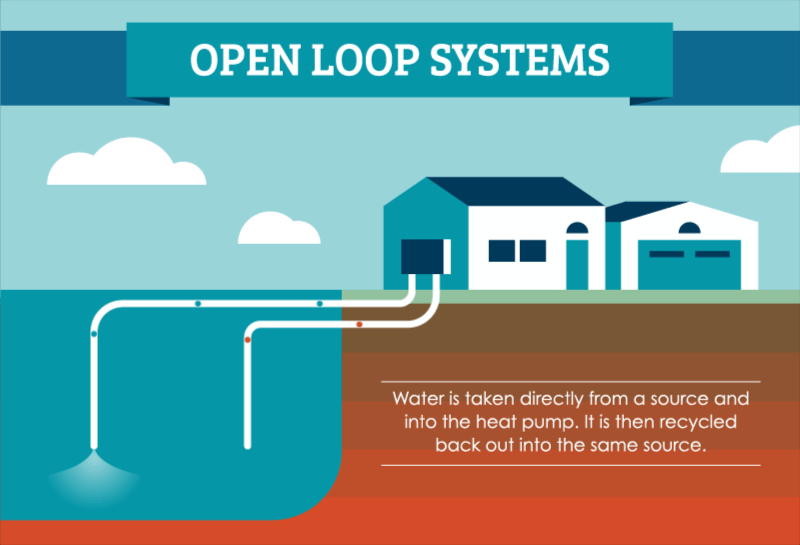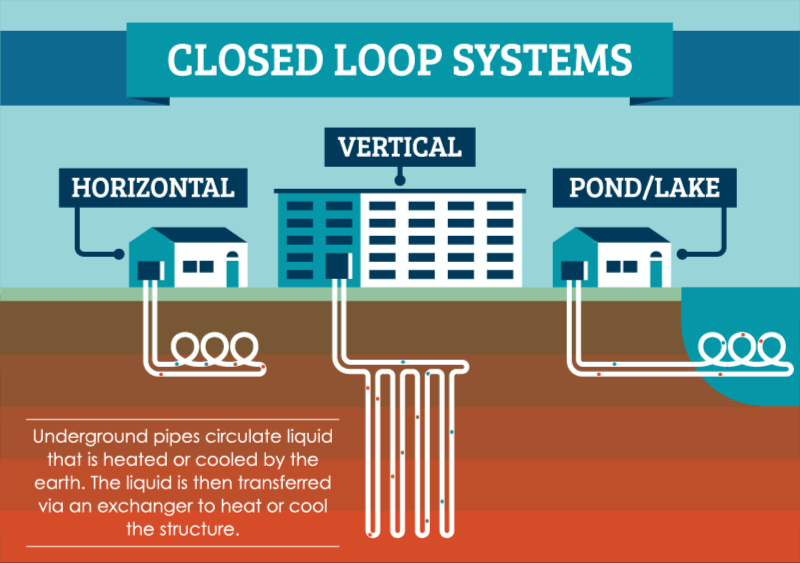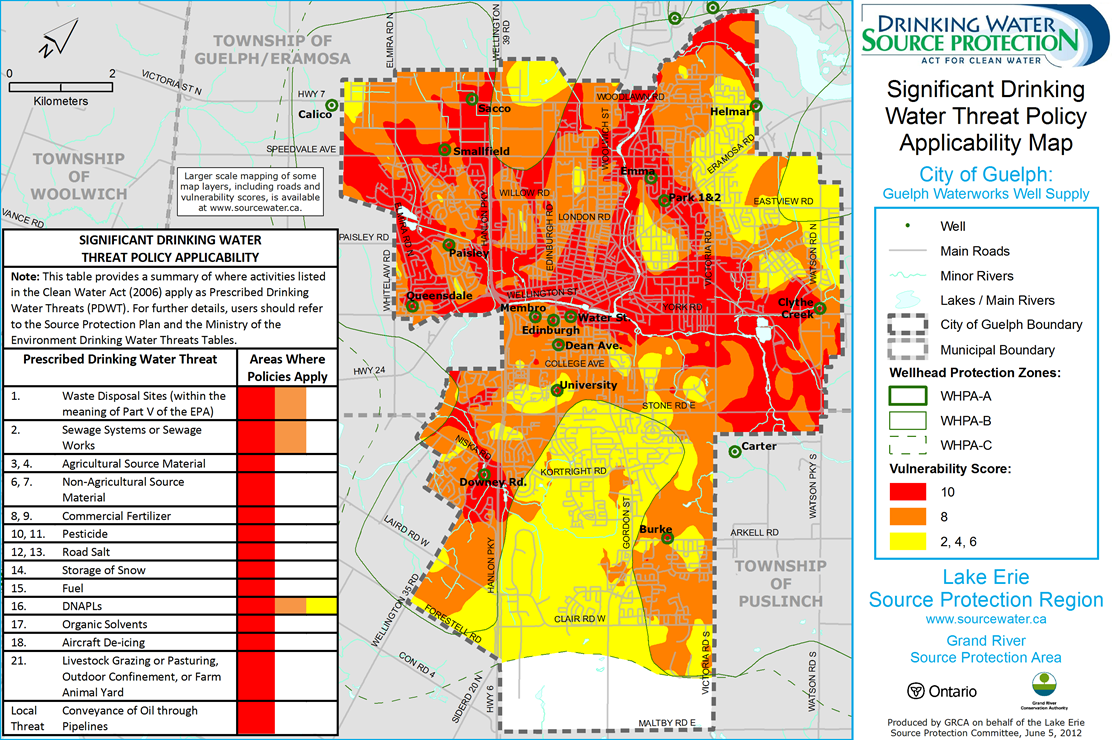On this page
Does your business affect Guelph’s water supply?
The City of Guelph’s drinking water source is groundwater. As such, and under the Clean Water Act, a considerable area within the City is considered to be vulnerable from a water quality and quantity perspective.
There are 22 threats to our drinking water in Guelph; these are some of the top threats:
- Handling, storing, and application of agricultural source materials, pesticides, commercial fertilizers, road salts
- Handling and storing fuels, organic solvents, dense non-aqueous phase liquids (DNAPLs)
- Operating a septic system
- Handling and/or storing waste including hazardous waste, polychlorinated biphenyls (PCBs) or liquid industrial waste
- Livestock grazing
- Applying and/or storing manure, fertilizer or pesticides
It’s important that businesses use hazardous materials and chemicals and winter salt responsibly, and store and dispose of the materials properly as well, to keep our groundwater safe.
Planning and building permit applications
All planning and building permit applications for properties in wellhead protection areas or intake protection zones must meet the requirements of Guelph-specific policies in the Grand River Source Protection Plan.
The City welcomes and encourages new residential and business growth; however, we live in an area with sensitivities and vulnerabilities, and we need to make sure we don’t create more problems that could harm our current and future water supply. We must protect the City’s water supply and consider all potential threats as they relate to development.
If you are planning to use, handle or store materials that could pose a threat to Guelph’s water supply, the City may require you to modify your application. For example, you may need to move the planned location of certain activities, reduce the volume of chemicals stored, or use an alternate chemical. The City may also require a risk management plan to be developed as part of your application.
Local source water protection policies apply to all proposed activities on a property, regardless of its current zoning. For example, a proposed chemical storage facility is subject to the requirements of the source protection plan, even if the property is currently zoned to permit such a facility.
The City cannot approve a planning or building permit application if it does not comply with the policies in the source protection plan.
Risk management plans
If you use, handle, or store materials that could pose a threat to Guelph’s water supply you may need to develop a risk management plan.
Your plan must demonstrate how you will mitigate drinking water threats using best management practices. In cases where spill response and other best management practices are already in place, a risk management plan can be simple and straightforward. Plans can be updated as operations change over time. Risk management plans are legally binding agreements negotiated between you and the City of Guelph.
Please complete the source water review form to determine if you need a risk management plan.
Forms and guidelines
- Transfer of review protocols
- Guidelines for private road salt management plans
- Guidelines for preparing risk management plans
- Section 59 policy applicability review form
- Wastewater survey report
Geothermal Systems in Guelph: some things to know
Are you considering geothermal for your next development? There are better solutions in Guelph. Guelph is unique, with unique geology- it’s what makes our water so great! Geothermal systems use groundwater to heat and cool buildings and facilities, however, there are constraints in Guelph because the city is dependent on groundwater for its municipal water supply.
Depending upon the type of system (open loop or closed loop-see figures below) the geothermal system will need to be constructed into the subsurface to operate properly.
Typical open loop system

- Based on well and aquifer testing, wells are constructed for the water taking and returning the groundwater.
- The drilling machines create hole diameters that are typically about 15 to 40 cm in diameter.
- Typically, high strength casing and annular seals are installed to support the well’s structure and complicated pumping and capping equipment are connected to the well.
- Permits to Take Water (PTTW) from MECP are typically required for open loop systems.
Typical closed loop system

- A typical residential system can have 3 to 8 holes drilled up to a depth of about 200 metres.
- Condominium and commercial systems can have up to 300 holes drilled, with each hole about 3 to 5 metres apart.
- For many years, pumping technology prevented drilling deeper, however, the ministry has recently received a permission application to drill up to 300 metres.
- Drilling deeper saves time as the industry attempts to keep drilling costs as low as possible to compete with natural gas systems, however, there are environmental and safety risks to drilling.
Our approach
The City of Guelph has developed a science-based review process to evaluate the feasibility of installing geothermal systems. As part of the development review process, applicants must indicate if they are considering a geothermal system at the earliest stages of the development process. The City has decided to take this step to ensure that our drinking water supplies are protected and that there are no unnecessary expenditures for applicants seeking a geothermal system where it is not feasible to construct.
Vulnerability map of Guelph

If your property is situated in a highly vulnerable area as shown in red and orange on the map (and close to a municipal drinking water well) City staff will not support the design and installation of a geothermal system on your property. The reasoning behind this is that geothermal systems have the potential to create what is called “transport pathways” which can allow contaminants and pathogens to move rapidly along the pathways and create unsafe drinking water in our municipal supply wells.
Alternately, if your property is located far enough away from our municipal drinking water wells, City staff will generally be supportive of the proposed geothermal system as it will not pose a high risk to our municipal drinking water wells.
In summary:
City approach recognizes the economic benefits of geothermal systems but wants the community to know we are constrained because of our rather unique geologic setting.
The science-based approach we have taken
- recognizes the risks of geothermal systems; and
- provides guidance to proponents to direct them to consider constructing such systems in areas of lower risk.
Accordingly, no geothermal systems in WHPA-A, or WHPA-B with a vulnerability score of 10 or 8 or within a 1 km radius from our municipal drinking water wells.
For more information
City of Guelph Information Report: Framework for Assessing Geothermal Energy Implementation
519-822-1260 extension 3320
[email protected]
